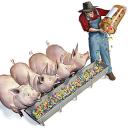 – One aspect of the world’s increasingly dire problems that one sees over and over again, is how special interest groups push their agendas to the top of the stack to the detriment of the whole.
– One aspect of the world’s increasingly dire problems that one sees over and over again, is how special interest groups push their agendas to the top of the stack to the detriment of the whole.
– It is a short sightedness that happens over and over and over again. Â And again, ‘No single raindrop thinks that it is responsible for the flood’.
– Here’s a story about American farms and how a decision that was for all of our benefits was pushed quietly aside by the Farm Lobby.
– Their profits will hold up a bit better over the next few years because of their actions, but all of us will suffer badly in the long run.
– When we do this sort of thing to ourselves over and over again, how can anyone have any real hope that we’re suddenly going to wake up and save ourselves collectively from the impending global environmental and climatic crises?
– – – – – – – – – – – – – – – –
Congress and the FDA must upend the nation’s agricultural policies to keep its food supply safe
Agriculture has fueled the eruption of human civilization. Efficiently raised, affordable crops and livestock feed our growing population, and hunger has largely been banished from the developed world as a result. Yet there are reasons to believe that we are beginning to lose control of our great agricultural machine. The security of our food supply is at risk in ways more noxious than anyone had feared.
The trouble starts with crops. Orange groves in Florida and California are falling to fast-moving blights with no known cure. Cavendish-variety bananas the global standard, each genetically identical to the next will almost certainly be wiped out by emerging infectious disease, just as the Cavendish’s predecessor was six decades ago. And as entomologists Diana Cox-Foster and Dennis vanEngelsdorp describe in “Saving the Honey bee,” on page 40, a mysterious affliction has ravaged honeybee colonies around the U.S., jeopardizing an agricultural system that is utterly dependent on farmed, traveling hives to pollinate vast swaths of monoculture. The ailment may be in part the result of the stresses imposed on hives by this uniquely modern system.
Plants and animals are not the only ones getting sick, however. New evidence indicates that our agricultural practices are leading directly to the spread of human disease.
Much has been made in recent years of MRSA, the antibiotic-resistant strain of Staphylococcus bacteria, and for good reason. In 2005, the most recent year for which figures are available, about 95,000 MRSA infections caused the deaths of nearly 19,000 Americans. The disease first incubated in hospitals the killer bacterium is an inevitable evolutionary response to the widespread use of antibiotics but has since found a home in locker rooms, prisons and child care facilities. Now the bacteria have spread to the farm.
Perhaps we should not be surprised. Modern factory farms keep so many animals in such a small space that the animals must be given low doses of antibiotics to shield them from the fetid conditions. The drug-resistant bacteria that emerge have now entered our food supply. The first study to investigate farm-bred MRSA in the U.S. amazingly, the Food and Drug Administration has shown little interest in testing the nation’s livestock for this disease recently found that 49 percent of pigs and 45 percent of pig workers in the survey harbored the bacteria. Unfortunately, these infections can spread. According to a report published in Emerging Infectious Diseases, MRSA from animals is now thought to be responsible for more than 20 percent of all human MRSA cases in the Netherlands.
In April 2008 a high-profile commission of scientists, farmers, doctors and veterinarians recommended that the FDA phase out the nontherapeutic use of antibiotics in farm animal production, to “preserve these drugs to treat sick animals, not healthy ones” in the words of former Kansas governor John Carlin, the commission’s chair. The FDA agreed and soon announced that it would ban the use of one widespread antibiotic except for strictly delineated medical purposes. But five days before the ban was set to take effect, the agency quietly reversed its position. Although no official reason was given, the opposition of the powerful farm lobby is widely thought to have played a role.
More… ➡
Tags: Antibiotics, Farm Lobby, FDA, MRSA